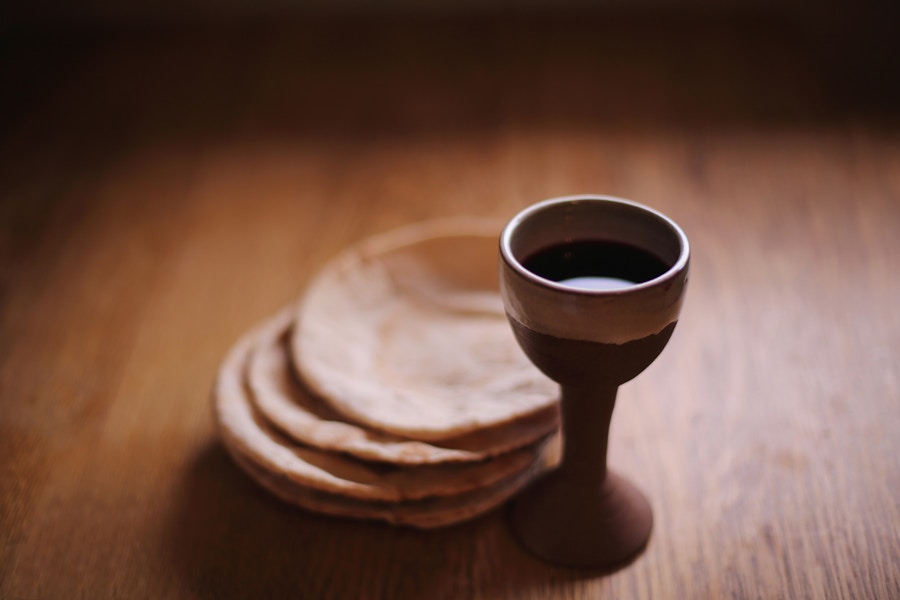Introductory Note:
Eucharisteo is the Greek word for thanksgiving. So, it is fitting that this excerpt from John Chrysostom’s homily centers the idea of thanksgiving around the celebration of the Eucharist.
Chrysostom marvels at the extravagance of God’s love, especially as poured out through the sacrifice of the Son and repeatedly reminds us not only to be grateful for the blessings that have been lavished on us, but for those given to our neighbors, too. In God’s family, he seems to say, a blessing given to one is a blessing given to all, as we join together in communion that is truly a thanksgiving.
Renovaré Team
To God let us give thanks continually. For it is too monstrous, enjoying as we do His bounty in deed every day, not so much as in word to acknowledge the favor; and this, though the acknowledgment again yield all its profit to us. Since He needs not, be sure, anything of ours: but we stand in need of all things from Him. Thus thanksgiving itself adds nothing to Him, but causes us to be nearer to Him. For if men’s bounties, when we call them to memory, do the more warm us with their proper love-charm; much more when we are continually bringing to mind the noble acts of our Lord towards us, shall we be more diligent in regard of His commandments.
For this cause Paul also said, “Be thankful” (Colossians 3:15). For the best preservative of any benefit is the remembrance of the benefit, and a continual thanksgiving.
For this cause, even the awful mysteries, so full of that great salvation, which are celebrated at every communion, are called a sacrifice of thanksgiving, because they are the commemoration of many benefits, and they signify the very sum of God’s care for us, and by all means they work upon us to be thankful. For if His being born of a virgin was a great miracle, and the evangelist said in amaze, “now all this was done,” His being also slain, what place shall we find for that? Tell me. I mean, if to be born is called “all this,” to be crucified, and to pour forth His blood, and to give Himself to us for a spiritual feast and banquet — what can that be called? Let us therefore give Him thanks continually, and let this precede both our words and our works.
But let us be thankful not for our own blessings alone, but also for those of others; for in this way we shall be able both to destroy our envy, and to rivet our charity, and make it more genuine. Since it will not even be possible for you to go on envying them, in behalf of whom you give thanks to the Lord.
Wherefore, as you know, the priest also enjoins to give thanks for the world, for the former things, for the things that are now, for what has been done to us before, for what shall befall us hereafter, when that sacrifice is set forth.
For this is the thing both to free us from earth, and to remove us into heaven, and to make us angels instead of men. Because they too form a choir, and give thanks to God for His good things bestowed on us, saying, Glory to God in the highest, and on earth peace, good will towards men. And what is this to us, that are not upon earth, nor are men? Nay, it is very much to us, for we have been taught so to love our fellow servants, as even to account their blessings ours.
Wherefore Paul also, everywhere in his epistles, gives thanks for God’s gracious acts to the world.
Let us too therefore continually give thanks, for our own blessings, and for those of others, alike for the small and for the great. For though the gift be small, it is made great by being God’s gift, or rather, there is nothing small that comes from Him, not only because it is bestowed by Him, but also in its very nature.
And to pass over all the rest, which exceed the sand in multitude; what is equal to the dispensation that has taken place for our sake? In that what was more precious to Him than all, even His only-begotten Son, Him He gave for us His enemies; and not only gave, but after giving, did even set Him before us as food; Himself doing all things that were for our good, both in giving Him, and in making us thankful for all this. For because man is for the most part unthankful, He does Himself everywhere take in hand and bring about what is for our good. And what He did with respect to the Jews, by places, and times, and feasts, reminding them of His benefits, that He did in this case also, by the manner of the sacrifice bringing us to a perpetual remembrance of His bounty in these things.
From “Homily 25 on Matthew” via NewAdvent.org.


